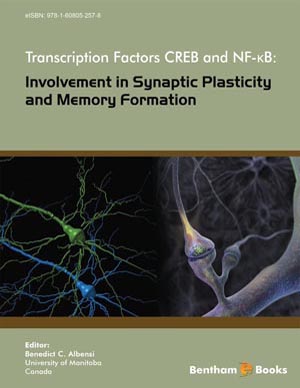Abstract
The cAMP Responsive Element Binding Protein (CREB) is an activity regulated transcription factor that modulates the transcription of genes with cAMP responsive elements (CRE) located in their promoter regions. In the central nervous system (CNS), an abundance of evidence has indicated that CREB-mediated transcription can be triggered through a number of pathways and is central to the induction of long-term synaptic changes and the formation of long-term memory. Dysfunction of CREB signaling has been implicated in the memory/cognitive impairments associated with a variety of CNS disorders, including Rubinstein-Tabyi Syndrome and Alzheimer’s disease, suggesting that CREB or proteins associated with CREB-mediated transcription may be a useful therapeutic target in the treatment of these disorders. Here, we review the key features of CREB-dependent transcription, the role for CREB in synaptic plasticity and long-term memory formation, and also summarize the data implicating CREB dysfunction in some of the disorders in which the formation and storage of memories are affected.
Keywords: CREB, Intracellular signaling, Synaptic plasticity, Long-term potentiation, Long-term memory, Fear memory, Spatial memory, Transgenic mice, Alzheimer’s disease, Rubinstein-Taybi syndrome, Coffin-Lowry syndrome.






















